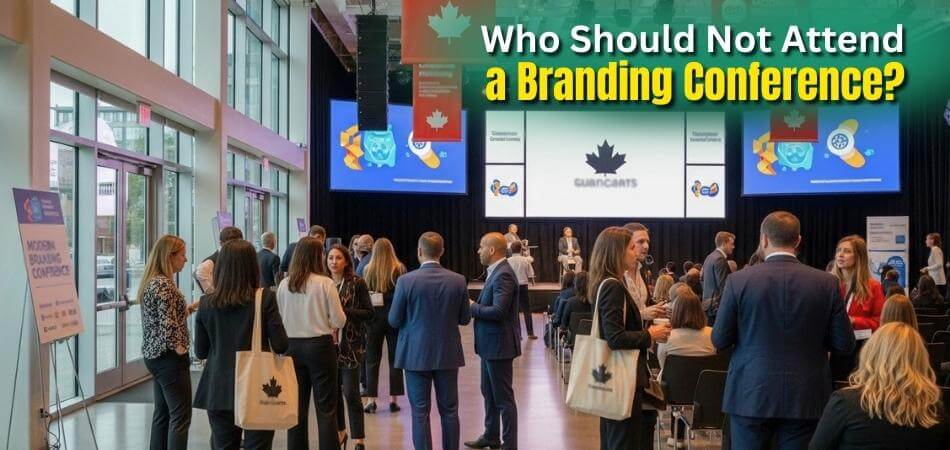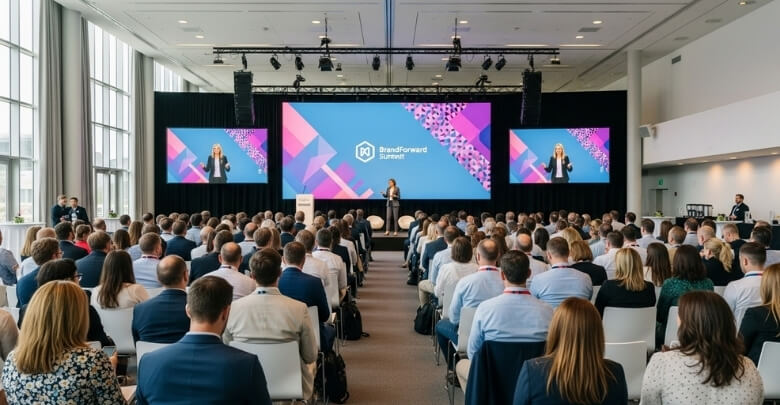Conferences bring people together to share ideas, and branding conferences are no different. They create space for learning, connections, and discussions about building strong identities in business. Still, some may wonder who should not attend a branding conference?
People who lack clear goals, have tight budgets, avoid networking, or aren’t ready to participate actively should not attend a branding conference. Without interest in learning or aligned content, the event may waste time, money, and offer little value.
Do you want to know why these events are not always the right fit for everyone? Keep reading this article to explore detailed insights and find every key point explained.
Who Should Not Attend a Branding Conference?
Sometimes people feel excited about joining a branding conference, but not everyone gets the real benefits. Before spending time and money, it is wise to check if the event truly fits your needs. Let’s see who should not attend.
No Clear Objectives
If you do not know why you want to attend, then the event may not be right for you. People who join usually want to learn, connect with others, or grow their brand. Without clear goals, it is easy to waste both time and money. A conference becomes valuable only when you know exactly what you want from it.
Limited Budget
Conference expenses go beyond just ticket fees. You need to plan for travel, accommodation, and sometimes sponsorship costs. If you are not ready financially, attending will feel more like a burden than a benefit. For example, if you’re preparing for global events like upcoming conferences in USA, you must be sure the cost makes sense for your situation.
Unwilling to Participate
These events are not just about listening to speakers. They are also about sharing ideas, asking questions, and meeting new people. If you only want to sit quietly and not join in, you will miss the real value. Conferences reward those who are active and open.
Content Misalignment
Not all branding conferences cover the same topics. Some focus on creative design, while others highlight digital marketing or business growth. If the subjects do not match what you are interested in, then the event may feel boring or irrelevant. Always check the agenda before booking your ticket.
Time Sacrifice
Conferences usually take a few days, which means you have to step away from your daily work. If your absence will cause delays or missed opportunities at the office, then attending might not be worth it. Time is just as valuable as money, so consider it carefully.
Wrong Expectations
Some people believe that one conference can completely change their business. This is not realistic. A conference gives you new ideas, contacts, and knowledge, but it is your responsibility to apply them later. Without realistic expectations, you might leave disappointed instead of motivated.
Not Open to Networking
Meeting new people is one of the biggest benefits of these events. If you are not interested in networking, you may miss valuable connections. Many business opportunities happen during casual talks and shared experiences at conferences. Without this effort, the event may not give you much value.
Avoiding Learning
The main purpose of conferences is to learn from experts, workshops, and presentations. If you are not willing to learn new skills or hear fresh ideas, then attending does not make sense. A closed attitude will only limit your experience and results.
Better Alternatives
Sometimes other resources can be more useful. Online courses, local seminars, or even one-on-one mentoring may provide better value depending on your goals. If those fit your current needs more than a big conference, it may be wiser to choose them instead.
A branding conference can be helpful only if you go with clear goals, a budget, and an open mind. If these conditions do not match your situation right now, it might be better to wait.
How Do Organizers Decide Who a Branding Conference Is Designed for?
Planning a branding conference always involves careful thought about who should attend. It is not a random decision, but one shaped by goals, type of content, and the kind of people who will benefit. Let’s look at how they decide.
Target Audience
The first step is to identify the main audience. Organizers look at whether the event is more useful for marketing professionals, business owners, students, or designers. They focus on who will benefit most from the sessions and networking opportunities.
Eligibility Rules
Some conferences are open to anyone interested, while others set conditions. For example, big conferences may expect attendees to have work experience or represent a company. Smaller or local events might allow students or newcomers to join more easily.
Program Structure
The structure of the event also shows who it is meant for. Workshops, panel talks, and expert-led sessions are designed differently for beginners, mid-level professionals, or advanced experts. The content is matched with the expected knowledge level of attendees.
Recommended Attendees
Event planners often outline recommended attendees for branding conference sessions, making it clear who will gain the most value. This avoids confusion and helps participants choose the right event for their goals and current skill level.
Learning and Networking
Besides learning, organizers also think about who will find the networking useful. They consider whether participants should connect with brand managers, entrepreneurs, or agencies. This ensures people meet others with similar interests or professional needs.
Organizers make these choices to ensure the right people attend, gain useful knowledge, and connect with others in their field. This careful planning keeps the event meaningful and rewarding for everyone.
Are Branding Conferences Worth It for People Outside Marketing or Business Fields?
Branding conferences are events where people come together to talk about how companies or individuals create their identity in the market. They often include talks, workshops, and networking opportunities. But do these events help people outside of marketing and business? Let’s break it down.
Limited Relevance
If you work in fields like science, engineering, medicine, or teaching, branding conferences may not add much to your daily work. These events are built for people who deal with company image, customer reach, and creative ideas in business.
Time Commitment
Branding conferences usually take a full day or even several days. If your work has nothing to do with branding or business strategy, that time may feel wasted. You could use that same time learning something directly linked to your field.
High Costs
Many branding conferences charge high fees for entry, not counting travel and stay. For someone outside of business or creative industries, paying this amount may not feel useful. The value you get might not match the money spent.
Networking Focus
A lot of people attend branding conferences to make business contacts. If you are not in business or marketing, you may feel left out of the conversations. Meeting people whose work has no connection with yours may not help you much.
Better Alternatives
If you want to grow in your own field, there are likely better options. Industry-specific workshops, research talks, or training sessions can be more useful. These will give you skills or knowledge you can apply right away in your job.
Branding conferences are powerful for those in marketing, business, or creative industries. But if your work is outside those areas, the time, money, and energy may be better spent on learning opportunities directly connected to your profession.
Who Should Reconsider Attending Large-scale Branding Conferences?
Large branding conferences can be exciting, with lots of people, ideas, and discussions happening in one place. But not every type of participant will find them as useful as they hope. Let’s look at who might want to think twice.
Very Niche Needs
If someone is searching for solutions that apply only to a very specific industry or problem, broad branding conferences may not be the right place. These events usually focus on general strategies that cover many sectors, not small, detailed cases.
Specialized Branding Experts
Those who already work in very narrow areas of branding often find such events too broad. Instead of learning something new, they might hear what they already know. Smaller workshops or focused seminars may be more effective for their needs.
Local Market Focus
If a person’s branding work is focused only on a local or regional market, large events may feel too global. The information shared often talks about trends that apply worldwide, which might not connect well with smaller community goals.
Limited Budgets
Large branding conferences can be costly, with fees, travel, and time away from work. People who only want highly targeted tips may not feel it is worth the expense. Choosing smaller events can save money and provide more direct value.
Quick Solutions Seekers
Branding takes time, but large events usually offer broad strategies instead of quick, step-by-step guides. People who want instant answers for a specific problem may leave disappointed because these events focus more on big-picture ideas.
Large branding conferences are great for learning broad trends and meeting people, but they are not always the best fit for everyone. Before attending, it’s smart to think about your real needs and goals.
When Are Branding Conferences More Suited for Presenters Than Attendees?
Branding conferences are not always built for everyone in the same way. Some events are designed with the speakers and researchers in mind, while others are planned for those who only want to learn. Let’s explore when the focus is mainly on presenters.
Research Sharing
Many conferences highlight new research and ideas in branding. These events are usually shaped around giving presenters a stage to share their findings. The aim is less about listening to basics and more about adding new knowledge to the field.
Presenter Priority
In presenter-focused conferences, the program is built to showcase talks, panels, or case studies by experts. Attendees are welcome, but the main spotlight is on those presenting their projects. The event’s success depends on the quality of these sessions.
Academic Style
Certain conferences are geared toward researchers and professionals who are preparing conference papers to share their work with peers. This academic setup means attendees listen, but the presenters are the real contributors shaping the discussions and themes.
Limited Audience Role
When the event is presenter-driven, the role of attendees is more passive. They are there to observe, take notes, and maybe ask a few questions. The main knowledge comes from the stage, not from group activities or workshops.
Knowledge Exchange
Even though the spotlight is on presenters, the goal remains knowledge exchange. Speakers introduce ideas, while attendees provide feedback or ask questions. This way, the event becomes a two-way flow of information, though more weighted toward the presenter’s side.
Presenter-focused branding conferences are shaped around sharing original ideas and research. While attendees gain insights, it is the presenters who drive the sessions and set the tone of the event.
FAQs About Who Should Not Attend a Branding Conference?
Before signing up for a branding conference, it is natural to have questions about whether it is really the right event for you. To make things easier, here are some common questions and answers that can help you decide wisely.
Is a Branding Conference Right for Someone Who Is Only Curious About the Topic?
If you are only curious about branding but not serious about applying it, a full conference might feel overwhelming. Conferences are usually fast-paced and filled with detailed discussions. Without a strong interest, you may not get much value. A short workshop or online video could be a better choice instead.
Should People Who Dislike Crowds Attend Branding Conferences?
Large conferences often attract hundreds of participants, which can feel crowded and busy. If you are uncomfortable in big groups, the environment may be stressful instead of helpful. Smaller events or online sessions might suit you better. This way, you still learn without feeling pressured.
Is It Useful for People Who Only Want Entertainment?
Branding conferences are designed for learning and professional growth. If someone is only looking for entertainment or fun activities, they may not enjoy the sessions. The talks and workshops require focus and attention. Entertainment seekers may leave disappointed because the event is more educational than playful.
Should Someone With No Interest in Branding Strategies Attend?
If you have no real interest in branding, then these events will not feel rewarding. The topics mainly revolve around building identity, customer trust, and marketing strategies. Without an interest in these subjects, the sessions may sound boring. It is better to invest time in something that excites you.
Are Branding Conferences Right for People Expecting Instant Success?
Branding is a long-term process, and conferences only provide tools, ideas, and contacts. If someone attends thinking their business will instantly grow overnight, they may be disappointed. Conferences are about learning and applying later, not quick success. Patience and action are needed after the event ends.
Should People Who Struggle With Long Schedules Attend?
Most branding conferences last for hours or even several days. If you find it hard to sit through long sessions, you may feel restless and lose interest. Such events need focus and stamina to gain the full benefits. Shorter training programs may work better for you.
Is It Right for Someone Who Avoids Meeting New People?
Networking is a huge part of branding events. If you do not enjoy talking to new people, you will miss out on important connections. Many insights are shared outside of the sessions during breaks or informal chats. Without this, the experience may feel incomplete.
Should People Who Want Personalized Guidance Attend?
Branding conferences usually offer general advice that applies to many industries. If you want very personalized help for your own situation, you may feel unsatisfied. One-on-one mentoring or private consulting might give you clearer answers. Conferences are better for broader ideas than tailored coaching.
Are These Events Right for Someone Who Dislikes Formal Discussions?
Most conferences include structured talks, panel sessions, and professional discussions. If you dislike formal settings, the format may feel too stiff. Some people prefer casual learning spaces, which these events usually do not provide. In that case, creative workshops or smaller group sessions might be a better match.
Should People Who Want to Avoid Extra Effort Attend?
A conference only works if you are ready to take notes, ask questions, and follow up later. If you just want to attend without putting in effort, the value will be very low. Branding growth needs action beyond the event. Without effort, the conference becomes just a day out.
Conclusion
Branding conferences can be exciting events, but they are not always the best choice for everyone. The benefits depend a lot on your goals, your field of work, and how open you are to networking and learning. Without these, the event may feel less meaningful.
When asking who should not attend a branding conference, the answer is simple. People without clear goals, those with limited budgets, unwilling to participate, or not aligned with the topics may not get real value. These groups often leave feeling unsatisfied.
If you ever plan to attend, make sure you know your objectives, check the agenda, and prepare to network. Look for events that match your field and budget. Stay realistic, stay open to learning, and you will gain the most. Best wishes in choosing wisely.








